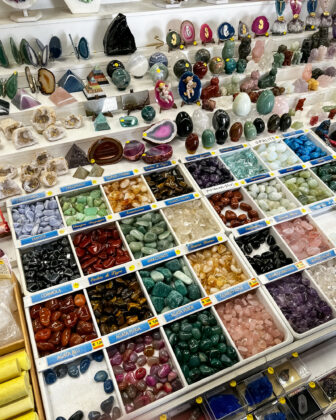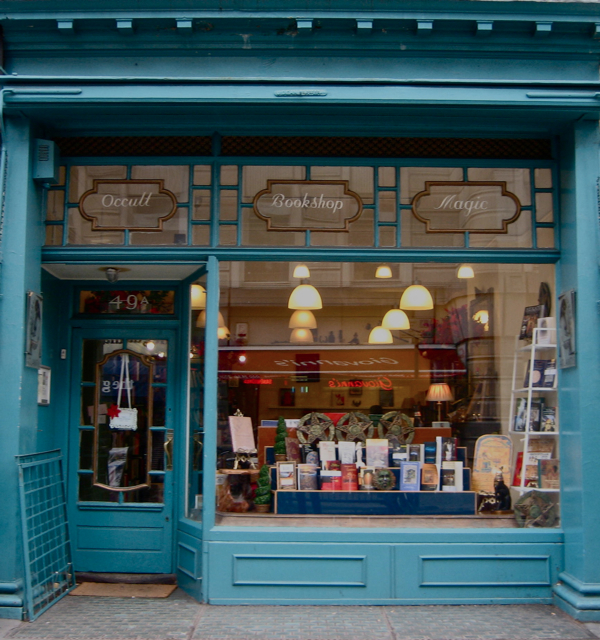
I am old enough now to wistfully reminisce about a golden time in Witchy and occult culture. Not so very long ago, and yet now it seems another lifetime, Witches, Warlocks, occultists, and the like, would gather at our local metaphysical shops, herbs, crystals, and books in hand, seeking both inspiration and community.
Here we would meet others who, like ourselves, chose to seek out philosophies and methodologies often deemed “forbidden” by both mainstream religion and society. In a sea of mostly pedestrian commercial offerings, rendered from sprawling stucco palaces in suburban cultural deserts, the metaphysical shop played a crucial role in offering those of us who did not exactly fit in a place to feel welcomed, be inspired, and even be challenged.
This is where we would first hear of new books and new authors, as well as be exposed to art and products set to expand our minds and deepen our practices. Local shops, as community hubs, would expand into networks centered around festivals, conventions, and conferences, where ideas, products, art, and community could all be more widely shared, strengthening the fabric of our communities as well as our individual lives and practices.
For some, this golden vision still exists. And if this is true for you, then the message of this piece is for you even more important. Because for many of us, this is becoming more and more of a hazy memory, a series of stories to be shared of “the good old days” when such places and events were far more common.
Many factors have contributed to the decline of the publicly accessible Witchy and occult space, not the least of which has been financial. Where once such shops thrived in urban and even suburban areas, rising rents have forced out many such businesses that simply cannot compete with corporate interests and corporate greed.

Colorful rocks and minerals are displayed in a metaphysical shop. [Image: DepositPhotos.]
I remember beautiful stores in my home state of California that were cultural hubs, like Gaia in Berkeley, which hosted figures like the late Rachel Pollack and Allen Ginsberg, among numerous others, people who shared their unique talents and knowledge to an eager public. I remember Curios and Candles in San Francisco, offering a “harder edge” approach to magic, and Merlin’s Magic Crystal in Dublin, which offered weekly healing nights and featured an intricately painted floor depicting angels, gods, and constellations. And even my own store, The Mystic Dream, which served Walnut Creek for over 30 years and was proud to host famed figures such as artist Susan Seddon Boulet and occultist Lon Milo DuQuette. Alas, all these are now but a memory.
While my store was able to rebrand and forge an online presence (DaturaTrading.com, if you’re so inclined), many others simply vanished, leaving a hole in the spiritual hearts of their local communities.
And it continues. The Raven’s Wing in Oakland announced it is set to close its doors after 16 years of serving the public, though its Portland location, as well as its online store, will remain. LightWeavers in Citrus Heights is currently struggling to keep its doors open and has started a GoFundMe to help those efforts. Aquarian Era in Concord has likewise asked the public for help to prevent their closure as they relocate to a more visible location in the hopes of securing more business in a dwindling financial climate.
And it’s not just happening in California. FaerieWorlds in Oregon and FaerieCon in Maryland announced they are closing after 20 years of magic. The Heartland Pagan Festival also recently announced that 2023 will be its final year, bringing 38 years to a close.
These are just the few that I personally know of or can remember, but I have heard similar from my friends across the country. Stores and events that had been around for 10, 20, even 30 years or more are being forced to close, in part because the economy and our convenience-based culture simply won’t support them anymore.

Atlantis Bookshop Photo Credit: The Good Author / Spitalfields Life
The internet has certainly made shopping more convenient and affordable in the short term, but, along with the pandemic, the long-term effects of reliance on large corporations for our products and materials are in part directly responsible for the demise of these cultural spaces. We might enjoy a cheaper price tag for books and tarot cards from large online retailers, but it comes at the cost of losing the very spaces in which we might be able to make deeper connections and even learn more about the books and products we seek.
Another aspect that has proven fatal to some of these spaces (for better or for worse) is the political. Events like PantheaCon, which over its 26-year history boasted a yearly attendance of anywhere from 1500 to 3000 Pagans, Witches, occultists, and others for workshops, classes, rituals, and community events (not to mention a vendor room that brought small occult and spiritual-themed business together from across the country) fell victim to its own inability to listen to the needs of the community it ostensibly served, drawing intense criticism from both trans activists and people of color for its refusal to adequately address issues of racism and transphobia, among others, leading to its closure in February of 2020.
One might argue that this is the way of any business – adapt or die – and to a degree, that is certainly true. But with the loss of events and stores that cater to our specific needs, we run the risk of losing so much more than a few dollars in our pocketbooks. Without these spaces in which we can come together and be exposed to new people and ideas, we begin to lose the cultural connections that enable us to learn and grow, both individually as well as collectively.
This has been a trend long in the making. I remember lamenting the loss of these stores going back 30 years. It has been a slow and steady march toward spiritual and cultural homogenization. But with this knowledge, let us rededicate ourselves to being part of the solution.
If you have a local, independently owned spiritual, metaphysical, or occult store, please consider patronizing them instead of just ordering from Amazon. These physical spaces might be a few dollars more expensive, but they are providing more than just the product you seek. They offer firsthand knowledge and experience, often from spiritual and magical practitioners who are doubling as cashiers and sales clerks. They can offer suggestions not based on an impersonal algorithm but on intuition and personal experience. And we need to help pay for that service if we wish to continue to have these spaces available in the future.
If you must order from an online shop, try to choose one that is also a small, independent business. It’s been strangely welcome news to hear that Barnes & Noble is making a comeback, but even better would be to support the small and often wacky independent stores that are in danger of becoming victims of the current cultural deforestation. One way to support these businesses is to purchase gift cards and even just “liking” and sharing of social media posts. Engagement can often translate to much-needed funds, even if only indirectly through shared promotion.
In the end, we all must adapt to the changing landscape of our cultural and economic lives. But if we continue to lose voices, perspectives, and opportunities to engage and share with each other, we will all lose, and it will be so much more of a loss than just a monetary one.
The Wild Hunt is not responsible for links to external content.
To join a conversation on this post:
Visit our The Wild Hunt subreddit! Point your favorite browser to https://www.reddit.com/r/The_Wild_Hunt_News/, then click “JOIN”. Make sure to click the bell, too, to be notified of new articles posted to our subreddit.